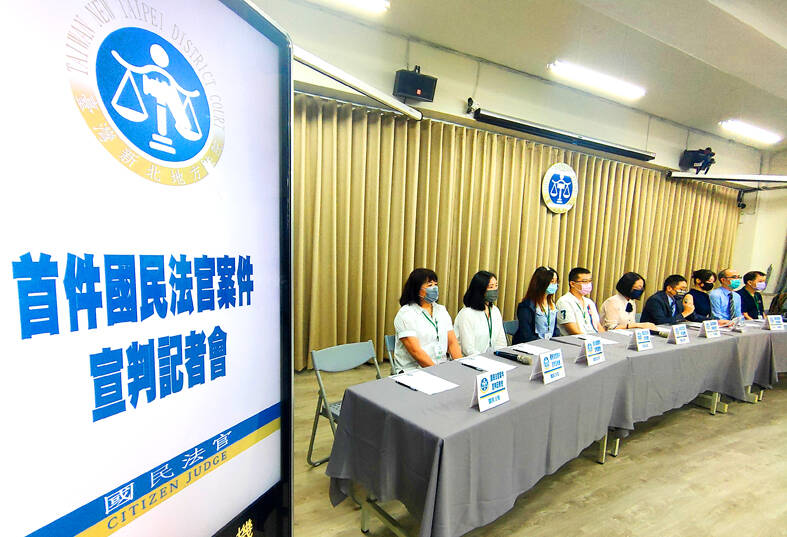The New Taipei City District Court yesterday sentenced a woman to seven years and two months in prison for murdering her husband in Taiwan’s first-ever criminal case to be tried by a mixed collegiate bench of lay and professional judges.
Taiwan began assigning lay judges with the implementation of the Citizen Judges Act (國民法官法) on Jan. 1.
A woman surnamed Chi (季), aged 63, was accused of stabbing her husband, surnamed Fan (范), aged 72, in his sleep on the evening of Nov. 30 last year.

Photo: Wang Yi-sung, Taipei Times
She confessed to the killing but pled for leniency on grounds of diminished capacity by mental duress and pitiable circumstances respectively under Article 19 and Article 59 of the Criminal Code, the court said in the verdict.
The prosecution did not contest the part of the defense’s case arguing that Chi’s voluntary surrender to the authorities qualified the defendant for sentencing mitigation, it said.
Chi claimed to be a victim of chronic domestic abuse by the deceased, which the prosecution also did not dispute, it said.
The prosecution contended that the accused was not acting under extreme mental duress at the time of the killing and her circumstances, albeit worth of sympathy, did not entitle her to further reductions to her sentencing, it said.
The prosecution said that Chi would serve a shorter time in prison than the sentence for aggravated assault, if the court allowed further sentence reductions in addition to her voluntary surrender.
The collegiate bench accepted the prosecution’s argument saying, based on Chi’s psychiatric examination, her capacity was not diminished at the time of the murder, it said.
The examiner’s testimony indicated that Chi was aware that murder was against the law and that options other than that were available at the time of the crime, the court said.
The court rejected the plea to reduce Chi’s sentence due to pitiable circumstances, as her case does not meet the legal standard “the offense is so pitiable that even the minimum punishment is considered too severe.”
Therefore, the bench accepted the prosecution’s position that Chi should receive a prison term of between eight and 12 years, the court said.
The collegiate bench handed down the sentence — which was close to the minimum prison term demanded by the prosecution — after three days of deliberations.
The lay members of the bench have performed well in keeping their focus and being attentive to details, a legal expert who observed the case as part of the public audience said on condition of anonymity.
The lay judges repeatedly asked to examine the “gruesome” crime scene photographs and asked relevant questions, they said.
Though some of the questions posed by the lay judges can be construed as prejudicial, these missteps fall into the normal range of expectations, they said, adding that the system of lay judges was meant to empower ordinary citizens.

DAREDEVIL: Honnold said it had always been a dream of his to climb Taipei 101, while a Netflix producer said the skyscraper was ‘a real icon of this country’ US climber Alex Honnold yesterday took on Taiwan’s tallest building, becoming the first person to scale Taipei 101 without a rope, harness or safety net. Hundreds of spectators gathered at the base of the 101-story skyscraper to watch Honnold, 40, embark on his daredevil feat, which was also broadcast live on Netflix. Dressed in a red T-shirt and yellow custom-made climbing shoes, Honnold swiftly moved up the southeast face of the glass and steel building. At one point, he stepped onto a platform midway up to wave down at fans and onlookers who were taking photos. People watching from inside

A Vietnamese migrant worker yesterday won NT$12 million (US$379,627) on a Lunar New Year scratch card in Kaohsiung as part of Taiwan Lottery Co’s (台灣彩券) “NT$12 Million Grand Fortune” (1200萬大吉利) game. The man was the first top-prize winner of the new game launched on Jan. 6 to mark the Lunar New Year. Three Vietnamese migrant workers visited a Taiwan Lottery shop on Xinyue Street in Kaohsiung’s Gangshan District (崗山), a store representative said. The player bought multiple tickets and, after winning nothing, held the final lottery ticket in one hand and rubbed the store’s statue of the Maitreya Buddha’s belly with the other,

‘NATO-PLUS’: ‘Our strategic partners in the Indo-Pacific are facing increasing aggression by the Chinese Communist Party,’ US Representative Rob Wittman said The US House of Representatives on Monday released its version of the Consolidated Appropriations Act, which includes US$1.15 billion to support security cooperation with Taiwan. The omnibus act, covering US$1.2 trillion of spending, allocates US$1 billion for the Taiwan Security Cooperation Initiative, as well as US$150 million for the replacement of defense articles and reimbursement of defense services provided to Taiwan. The fund allocations were based on the US National Defense Authorization Act for fiscal 2026 that was passed by the US Congress last month and authorized up to US$1 billion to the US Defense Security Cooperation Agency in support of the

‘COMMITTED TO DETERRENCE’: Washington would stand by its allies, but it can only help as much as countries help themselves, Raymond Greene said The US is committed to deterrence in the first island chain, but it should not bear the burden alone, as “freedom is not free,” American Institute in Taiwan Director Raymond Greene said in a speech at the Institute for National Defense and Security Research’s “Strengthening Resilience: Defense as the Engine of Development” seminar in Taipei yesterday. In the speech, titled “Investing Together and a Secure and Prosperous Future,” Greene highlighted the contributions of US President Donald Trump’s administration to Taiwan’s defense efforts, including the establishment of supply chains for drones and autonomous systems, offers of security assistance and the expansion of